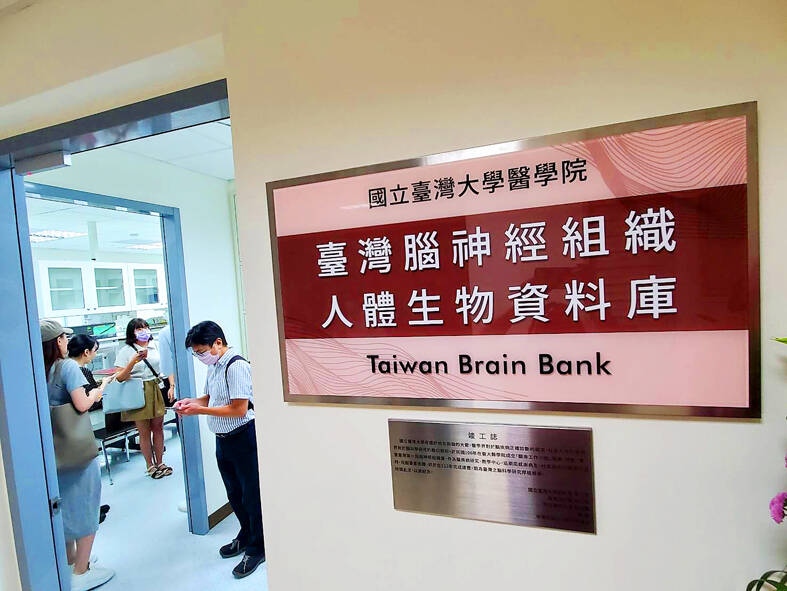The nation’s first brain bank opened in Taipei yesterday, with Premier Chen Chien-jen (陳建仁) expressing his hopes that it would also make Taiwan a bellwether in neuroscience in Asia.
National Taiwan University’s (NTU) College of Medicine yesterday hosted a plaque unveiling ceremony for the Taiwan Brain Bank, which was attended by Chen, National Health Research Institutes president Sytwu Huey-kang (司徒惠康), NTU vice president Chang Shan-chwen (張上淳), Minister of Health and Welfare Hsueh Jui-yuan (薛瑞元) and Taiwan Brain Bank Association chairman Hsieh Sung-tsang (謝松蒼).
“Many chronic diseases affecting the nation’s increasingly aging population — such as dementia and Parkinson’s disease — are related to the brain,” Chen said.

Photo: Lin Hui-chin, Taipei Times
“The establishment of the Taiwan Brain Bank would help scientists study various cerebral diseases, which could help prevent people from getting them and enable medical experts to begin patients’ treatment early,” he said. “This would also make Taiwan a bellwether in brain science in Asia.”
The brain bank belongs to the nation, not NTU, Chang said.
“Today is only the beginning, and the brain bank cannot sustain itself with the budget allocated to the medical school alone. We are calling for long-term financial support from the government,” Chang said.

Photo: George Tsorng, Taipei Times
In the past, the focus of neuroscience was studying data gathered through neuroimaging, Hsueh said, adding that the brain bank would allow neuroscientists to analyze brains directly.
“We understand that funding is needed to maintain the operations of the brain bank, so part of the technology budget would be used for this purpose. Another challenge would be to encourage voluntary donations of brains, which requires joint cooperation of the medical community and different patient groups,” Hsueh said.
“People need to know the importance of organ donations and give their consent to donate while they are alive. Their families should also give their consent,” he said.
There are about 150 brain banks worldwide, Hsieh said, adding that having brain banks is an indicator of prosperity.
“Unlike brain banks in other countries that were established by the government, the Taiwan Brain Bank was initiated by patients and their relatives who wanted to contribute by donating their brains for research,” Hsieh said.
Hsieh began leading a workforce to establish the brain bank in 2017, when they faced the challenge of finding a legal basis for such an institution. The problem was resolved after the Ministry of Health and Welfare issued interpretations of relevant regulations.
The brain bank also spent three years training its personnel and installing relevant facilities before it was officially established yesterday.

AIR SUPPORT: The Ministry of National Defense thanked the US for the delivery, adding that it was an indicator of the White House’s commitment to the Taiwan Relations Act Deputy Minister of National Defense Po Horng-huei (柏鴻輝) and Representative to the US Alexander Yui on Friday attended a delivery ceremony for the first of Taiwan’s long-awaited 66 F-16C/D Block 70 jets at a Lockheed Martin Corp factory in Greenville, South Carolina. “We are so proud to be the global home of the F-16 and to support Taiwan’s air defense capabilities,” US Representative William Timmons wrote on X, alongside a photograph of Taiwanese and US officials at the event. The F-16C/D Block 70 jets Taiwan ordered have the same capabilities as aircraft that had been upgraded to F-16Vs. The batch of Lockheed Martin

GRIDLOCK: The National Fire Agency’s Special Search and Rescue team is on standby to travel to the countries to help out with the rescue effort A powerful earthquake rocked Myanmar and neighboring Thailand yesterday, killing at least three people in Bangkok and burying dozens when a high-rise building under construction collapsed. Footage shared on social media from Myanmar’s second-largest city showed widespread destruction, raising fears that many were trapped under the rubble or killed. The magnitude 7.7 earthquake, with an epicenter near Mandalay in Myanmar, struck at midday and was followed by a strong magnitude 6.4 aftershock. The extent of death, injury and destruction — especially in Myanmar, which is embroiled in a civil war and where information is tightly controlled at the best of times —

Taiwan was ranked the fourth-safest country in the world with a score of 82.9, trailing only Andorra, the United Arab Emirates and Qatar in Numbeo’s Safety Index by Country report. Taiwan’s score improved by 0.1 points compared with last year’s mid-year report, which had Taiwan fourth with a score of 82.8. However, both scores were lower than in last year’s first review, when Taiwan scored 83.3, and are a long way from when Taiwan was named the second-safest country in the world in 2021, scoring 84.8. Taiwan ranked higher than Singapore in ninth with a score of 77.4 and Japan in 10th with

China's military today said it began joint army, navy and rocket force exercises around Taiwan to "serve as a stern warning and powerful deterrent against Taiwanese independence," calling President William Lai (賴清德) a "parasite." The exercises come after Lai called Beijing a "foreign hostile force" last month. More than 10 Chinese military ships approached close to Taiwan's 24 nautical mile (44.4km) contiguous zone this morning and Taiwan sent its own warships to respond, two senior Taiwanese officials said. Taiwan has not yet detected any live fire by the Chinese military so far, one of the officials said. The drills took place after US Secretary